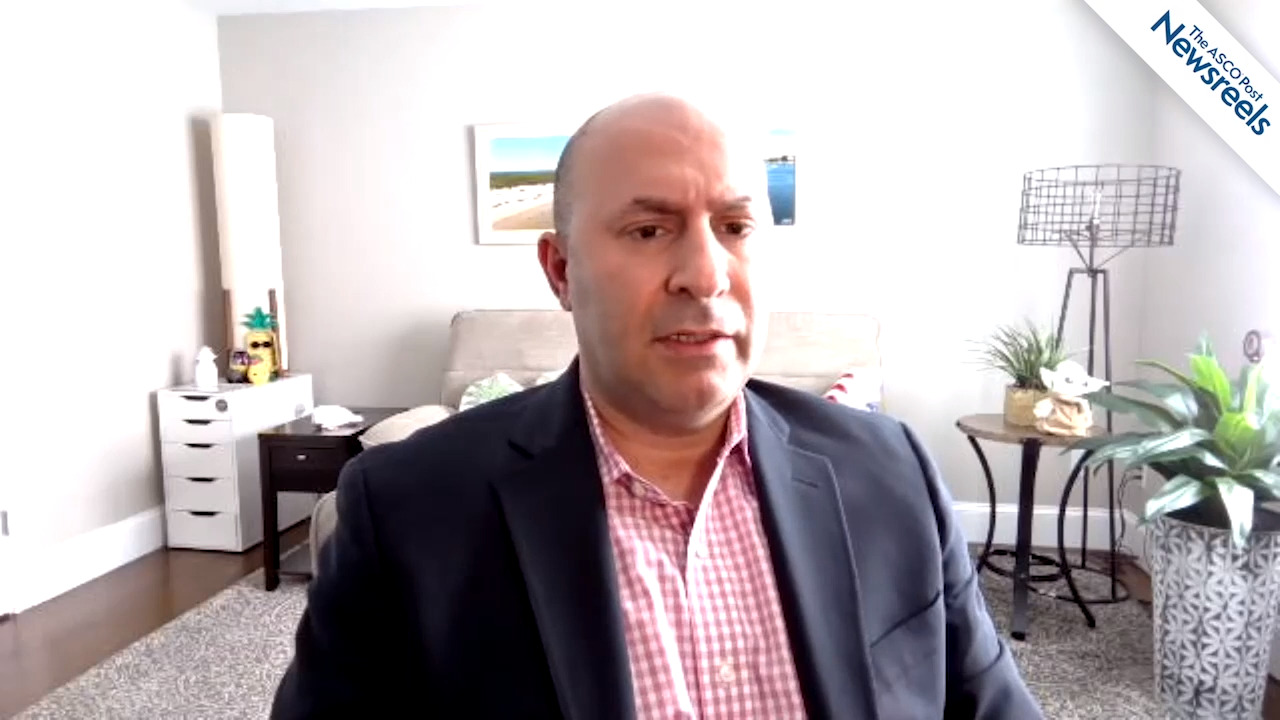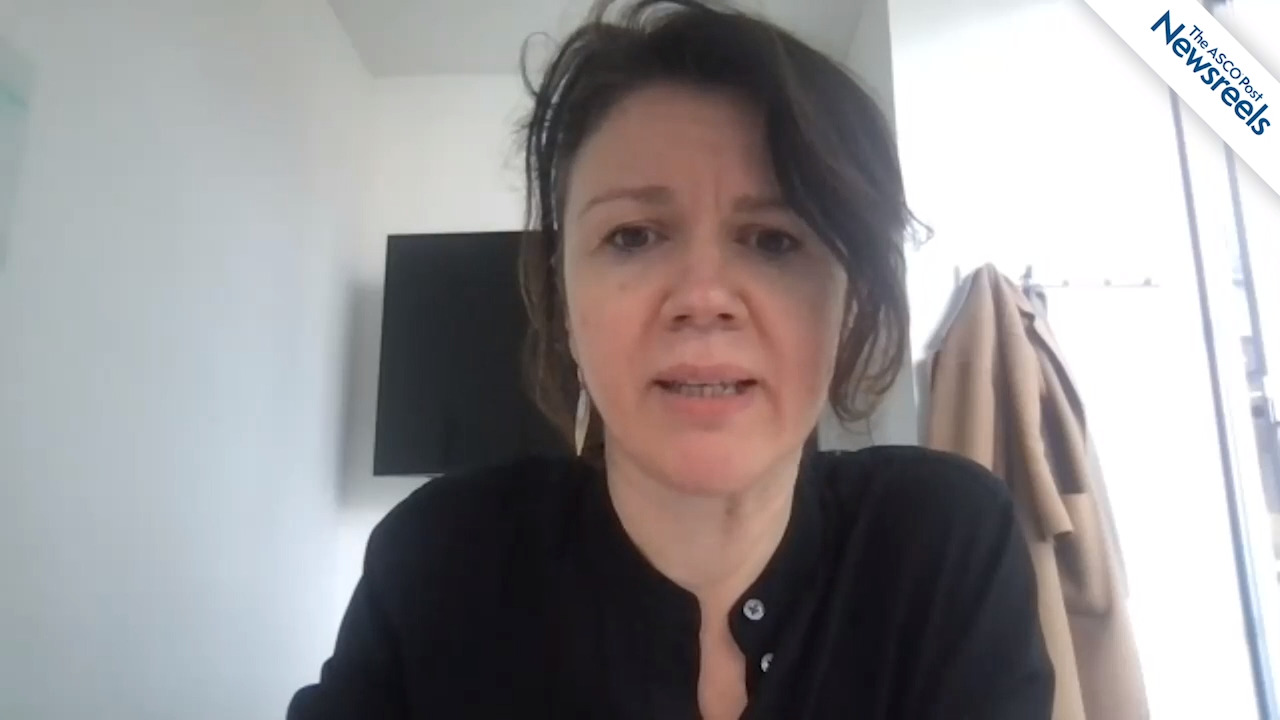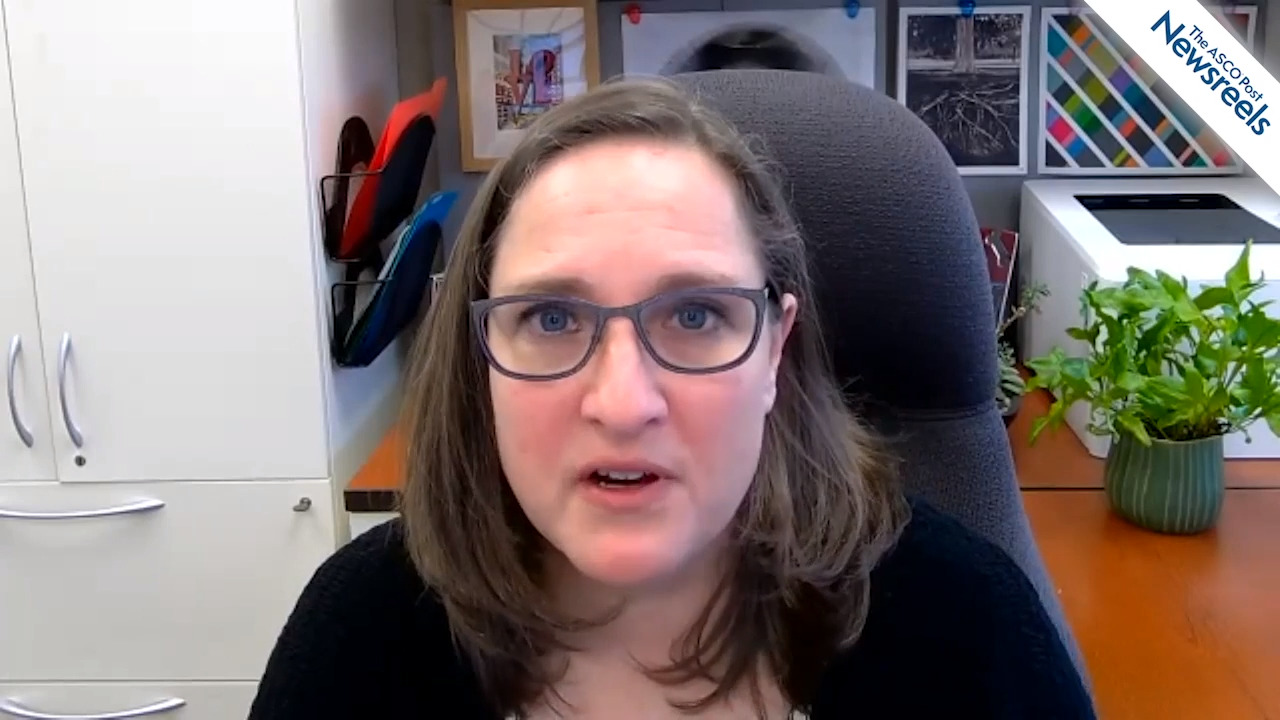Brian I. Rini, MD, on RCC: Pembrolizumab Plus Axitinib vs Sunitinib as First-Line Therapy
Brian I. Rini, MD, of Vanderbilt University, discusses findings from KEYNOTE-426, the longest follow-up of a checkpoint inhibitor (pembrolizumab) combined with a VEGF/VEGFR inhibitor (axitinib) for first-line clear cell renal cell carcinoma. The trial results continue to support this combination as a standard of care for patients with previously untreated disease (Abstract 4500).
No Survival Difference for Front-Line Combination Regimens in Intermediate- and Poor-Risk Clear Cell RCC: Real-World Outcomes
A large retrospective study of real-world patients with renal cell carcinoma (RCC) showed similar survival outcomes for patients with intermediate- or poor-risk disease regardless of whether they were treated with the combination of axitinib plus pembrolizumab or ipilimumab plus nivolumab. These...
Adjuvant Pembrolizumab Extends Disease-Free Survival in High-Risk Renal Cell Carcinoma
Immunotherapy following surgery significantly improved disease-free survival compared to placebo among patients with high-risk clear cell renal cell carcinoma (RCC), according to results from the international phase III KEYNOTE-564 study presented at the 2021 ASCO Annual Meeting by Toni K....
Toni K. Choueiri, MD, on Renal Cell Carcinoma: Pembrolizumab vs Placebo in Adjuvant Treatment
Toni K. Choueiri, MD, of Dana-Farber Cancer Institute, discusses phase III results from KEYNOTE-564, which evaluated the safety and efficacy of pembrolizumab in the adjuvant treatment of patients with renal cell carcinoma who have undergone nephrectomy for intermediate-high or high-risk disease or no evidence of disease (Abstract LBA5).
Real-World Survival Outcomes With Various Treatment Regimens for Metastatic Renal Cell Carcinoma
In a real-world retrospective propensity-matched cohort study reported in JAMA Network Open, Chakiryan et al found that both first-line immunotherapy and combined treatment with targeted therapy plus immunotherapy were associated with improved overall survival vs targeted therapy alone in patients...
AUA Announces Updates to Clinical Guidance for Renal Mass and Localized Renal Cancer
The American Urological Association (AUA) announced amendments to its clinical guideline on Renal Masses and Localized Renal Cancer, originally published in 2013 and updated in 2017, based on an additional literature search conducted through October 2020. One in four renal masses are benign;...
First-Line Nivolumab Plus Cabozantinib Improves Progression-Free and Overall Survival vs Sunitinib in Advanced Renal Cell Carcinoma
As reported in The New England Journal of Medicine by Toni K. Choueiri, MD, of Lank Center for Genitourinary Oncology, Dana-Farber Cancer Institute, and colleagues, the phase III CheckMate 9ER trial has shown that the combination of nivolumab and cabozantinib improved progression-free survival and...
FDA Pipeline: Priority Reviews in Kidney and Endometrial Cancers, Cholangiocarcinoma
Recently, the U.S. Food and Drug Administration (FDA) has granted Priority Review to the combination of pembrolizumab and lenvatinib for the treatment of both advanced renal cell carcinoma (RCC) and endometrial carcinoma. The FDA also granted Priority Review to ivosidenib for the treatment of...
Study Explores Racial Disparities in Renal Cell Carcinoma by Stage and Mortality
Research recently published by Valencia et al in the journal Cancers found that advanced-stage kidney cancer is more common in Hispanic American and Native American patients than in non-Hispanic White patients. Using data from the National Cancer Database and the Arizona Cancer Registry,...
Genitourinary Oncology Highlights 2020–2021 Almanac
Landmark changes in the treatment of genitourinary cancers have occurred over the past year, as summarized in this year’s Genitourinary Oncology Almanac from The ASCO Post. Starting with our area of focus, metastatic renal cell carcinoma, the saga continues with two more positive phase III trials...
Two Lenvatinib Combinations Improve Progression-Free Survival vs Sunitinib Alone in First-Line Treatment of Advanced Renal Cell Carcinoma
As reported in The New England Journal of Medicine by Robert J. Motzer, MD, of Memorial Sloan Kettering Cancer Center (MSK), and colleagues, the phase III CLEAR trial has shown prolonged progression-free survival with lenvatinib/pembrolizumab and with lenvatinib/everolimus vs sunitinib and...
New Study Finds Baseline Brain Imaging Should Be Considered for Patients With Metastatic RCC
A report published by Kotecha et al in JNCCN–Journal of the National Comprehensive Cancer Network suggests that baseline brain imaging should be considered in most patients with metastatic renal cell carcinoma (RCC). Researchers found incidental brain metastases occur in a clinically significant...
Samra Turajlic, MBBS, PhD, on Understanding Metastatic Disease in Renal Cancer and Melanoma
Samra Turajlic, MBBS, PhD, of The Francis Crick Institute, discusses our limited understanding of metastases in terms of the timing of dissemination, the many metastatic phenotypes and varieties of seeding, as well as how the spread of cancer evades the immune system and resists treatment. Expanding this knowledge base is critical to better managing malignant disease.
Brian I. Rini, MD, on Renal Cell Carcinoma: Data on Atezolizumab, Bevacizumab, and Sunitinib
Brian I. Rini, MD, of Vanderbilt University, discusses the IMmotion151 trial results on overall survival and the association of gene expression and clinical outcomes with atezolizumab plus bevacizumab vs sunitinib in patients with locally advanced or metastatic renal cell carcinoma (Abstract CT188).
Expert Point of View: David A. Braun, MD, PhD
Invited discussant David A. Braun, MD, PhD, of Dana-Farber Cancer Institute, Boston, said there are a couple of established pillars of systemic therapy for metastatic renal cell carcinoma (RCC). “An immune checkpoint inhibitor is a strong pillar, a [vascular endothelial growth factor tyrosine...
Belzutifan Shows Activity in Advanced Renal Cell Carcinoma, Both as a Single Agent and in Combination Therapy
Separate studies presented at the 2021 Genitourinary Cancers Symposium provide supportive evidence for belzutifan (formerly MK-6482) as an active treatment for metastatic clear cell renal cell carcinoma (RCC). One study showed single-agent activity for this novel approach in an early-phase trial,...
Expert Point of View: Xin Gao, MD
Xin Gao, MD, a medical oncologist at Mass General Hospital and Instructor at Harvard Medical School, said these were important findings. “Analyses of patient-reported outcomes pertaining to health-related quality-of-life measures from CheckMate 9ER showed significantly improved quality-of-life...
Patient-Reported Outcomes With Nivolumab Plus Cabozantinib in Advanced Renal Cell Carcinoma
Results of the CheckMate 9ER phase III trial showed significantly improved patient-reported outcomes in quality of life for first-line treatment with nivolumab plus cabozantinib compared with sunitinib for patients with advanced renal cell carcinoma.1 These findings are in line with the previously...
Pembrolizumab in First-Line Treatment of Metastatic Clear Cell and Non–Clear Cell Renal Cell Carcinoma
The treatment paradigm for patients with metastatic renal cell carcinoma has undergone a dramatic shift over the past few years, improving outcomes for many patients but leaving many unanswered questions as to how to optimally choose the best treatment for an individual patient. The changes are...
KEYNOTE-427: First-Line Pembrolizumab Shows Activity in Advanced Clear Cell and Non–Clear Cell Kidney Cancers
As reported in two articles in the Journal of Clinical Oncology by David F. McDermott, MD, of Beth Israel Deaconess Medical Center, and colleagues, the phase II KEYNOTE-427 study showed that pembrolizumab monotherapy produced durable responses as first-line treatment in cohorts of patients with...
Eric Jonasch, MD, on Hereditary Renal Cell Carcinoma: Screening, Diagnosis, and Management
Eric Jonasch, MD, of The University of Texas MD Anderson Cancer Center, discusses the several hereditary renal cell cancer syndromes, the importance of surveillance for both renal and nonrenal manifestations, and the treatment options available.
Nivolumab Plus Cabozantinib as First-Line Treatment of Advanced Renal Cell Carcinoma
On January 22, 2021, the U.S. Food and Drug Administration approved the combination of nivolumab and cabozantinib as first-line treatment for patients with advanced renal cell carcinoma.1-3 Supporting Efficacy Data Approval was based on the findings of the phase III, open-label CheckMate 9ER trial...
SWOG 1500: Cabozantinib Extends Progression-Free Survival vs Sunitinib in Metastatic Papillary Renal Cell Carcinoma
Cabozantinib achieved a statistically significant and clinically meaningful extension in progression-free survival compared with sunitinib in patients with metastatic papillary renal cell carcinoma, a relatively uncommon type of renal cell carcinoma, according to the randomized phase II SWOG 1500...
Lenvatinib/Pembrolizumab Combination Improves Outcomes vs Sunitinib in Renal Cell Carcinoma
The combination of lenvatinib plus pembrolizumab was superior to sunitinib for progression-free and overall survival as well as other key endpoints in patients with advanced clear cell renal cell carcinoma (RCC), according to results of the phase III CLEAR trial presented at the 2021 Genitourinary ...
FDA Pipeline: Priority Review for Kidney Cancer Treatment, Fast Track Designation for NSCLC Treatment
Recently, the U.S. Food and Drug Administration (FDA) granted Priority Review to the HIF-2α inhibitor belzutifan for the treatment of patients with von Hippel-Lindau (VHL) disease–associated renal cell carcinoma. The agency also granted Fast Track designation to poziotinib for the treatment of...
CheckMate 9ER: First-Line Nivolumab Plus Cabozantinib vs Sunitinib for Advanced Renal Cell Carcinoma
As reported in The New England Journal of Medicine by Toni K. Choueiri, MD, and colleagues, the phase III CheckMate 9ER trial has shown that the combination of nivolumab and cabozantinib improved progression-free survival and overall survival vs sunitinib in first-line treatment of patients with...
Immunotherapy for Advanced Kidney Cancer: Effect of Body Mass Index
In a study reported in a research letter in JAMA Oncology, Lalani et al found that higher body mass index (BMI) was associated with better overall survival among patients with metastatic renal cell carcinoma receiving anti–PD-1/PD-L1–based immune checkpoint inhibitor treatment. No association of...
FDA Approves Tivozanib for Relapsed or Refractory Advanced Renal Cell Carcinoma
On March 10, the U.S. Food and Drug Administration (FDA) approved tivozanib (Fotivda), a kinase inhibitor, for adult patients with relapsed or refractory advanced renal cell carcinoma following two or more prior systemic therapies. TIVO-3 Efficacy was evaluated in TIVO-3 (ClinicalTrials.gov...
SWOG 1500: Cabozantinib, Crizotinib, or Savolitinib vs Sunitinib in Metastatic Papillary Renal Cell Carcinoma
In the phase II SWOG 1500 study reported in The Lancet, Pal et al found that among three comparator MET kinase inhibitors, cabozantinib prolonged progression-free survival vs sunitinib in metastatic papillary renal cell carcinoma. Study Details In the open-label trial, 147 eligible patients from...
CLEAR Trial: Is Lenvatinib Plus Pembrolizumab the Best First-Line Immunotherapy Doublet in Metastatic Renal Cell Carcinoma?
At the 2021 Genitourinary Cancers Symposium, Motzer et al presented the clinical results of the CLEAR trial, adding a novel regimen, lenvatinib plus pembrolizu-mab, to the growing armamentarium of first-line treatments for patients with metastatic clear cell renal cell carcinoma (RCC). The...
KEYNOTE-427: First-Line Pembrolizumab in Advanced Non–Clear Cell Renal Cell Carcinoma
As reported in the Journal of Clinical Oncology by McDermott et al, findings in a cohort of the phase II KEYNOTE-427 study showed that pembrolizumab monotherapy produced durable responses as first-line treatment for advanced non–clear cell renal cell carcinoma. In a separate cohort of the study,...
Elizabeth R. Plimack, MD, on Renal Cell Cancer Highlights From the 2021 Genitourinary Cancers Symposium
Elizabeth R. Plimack, MD, of Fox Chase Cancer Center, discusses key abstracts discussed at this year’s meeting on renal cell carcinoma and offers her views on the latest trends and findings (Abstracts 269, 308, 270, 313).
Elizabeth R. Plimack, MD, on RCC: Outcomes With Pembrolizumab Plus Axitinib
Elizabeth R. Plimack, MD, of Fox Chase Cancer Center, discusses phase III results from the KEYNOTE-426 study—specifically, an exploratory subgroup analysis of patients with advanced renal cell carcinoma who were randomly assigned to receive pembrolizumab plus axitinib and completed 2 years of treatment (Abstract 327).
Sumanta K. Pal, MD, on Advanced RCC: Tivozanib to Treat Disease Progression After Axitinib
Sumanta K. Pal, MD, of City of Hope, discusses findings of the TIVO-3 study, which showed that the tyrosine kinase inhibitor tivozanib improved progression-free survival vs sorafenib in patients whose advanced renal cell carcinoma progressed after multiple lines of therapy (Abstract 278).
Sumanta K. Pal, MD, on Papillary RCC: Sunitinib vs Cabozantinib, Crizotinib, or Savolitinib in Metastatic Disease
Sumanta K. Pal, MD, of City of Hope, discusses phase II results from the SWOG 1500 study, which showed that compared with crizotinib and savolitinib, cabozantinib was the only agent that prolonged progression-free survival vs sunitinib in patients with metastatic papillary renal cell carcinoma (Abstract 270).
Christopher Sweeney, MBBS, and Thomas Powles, MD, PhD, on Treating GU Malignancies: Expert Views
A spirited discussion ensued when we asked Christopher Sweeney, MBBS, of Dana-Farber Cancer Institute, and Thomas Powles, MD, PhD, of Cancer Research UK Barts Centre, to compare notes on how they treat bladder, prostate, and kidney cancers.
Toni K. Choueiri, MD, on Clear Cell RCC: Treatment With Belzutifan Plus Cabozantinib
Toni K. Choueiri, MD, of Dana-Farber Cancer Institute, discuses a preliminary phase II analysis of the HIF-2a inhibitor belzutifan in combination with cabozantinib, which showed antitumor activity in previously treated patients with metastatic clear cell renal cell carcinoma (Abstract 272).
KEYNOTE-427: First-Line Pembrolizumab in Advanced Clear Cell Renal Cell Carcinoma
As reported in the Journal of Clinical Oncology by McDermott et al, findings in a cohort of the phase II KEYNOTE-427 study showed that pembrolizumab monotherapy produced durable responses as first-line treatment for advanced clear cell renal cell carcinoma. In a separate cohort of the study,...
Toni K. Choueiri, MD, on RCC: Treatment With Lenvatinib Plus Pembrolizumab or Everolimus vs Sunitinib
Toni K. Choueiri, MD, of Dana-Farber Cancer Institute, discusses phase III results of the CLEAR study, which showed that for first-line treatment of advanced renal cell carcinoma, lenvatinib plus pembrolizumab improved outcomes vs sunitinib. Lenvatinib plus everolimus also improved progression-free survival and overall survival rates vs sunitinib (Abstract 269).
Lenvatinib Combination Regimens vs Sunitinib in Renal Cell Carcinoma: Phase III CLEAR Trial
The combination of lenvatinib plus pembrolizumab showed superiority over sunitinib in terms of overall survival, progression-free survival, and objective response rate in patients with advanced clear cell renal cell carcinoma (RCC), according to results of the phase III CLEAR trial. The CLEAR study ...
Implications of Delaying Surgery for Renal Cell Carcinoma During the COVID-19 Pandemic
During the peak of the COVID-19 pandemic, several elective surgeries for renal cell carcinoma were delayed, with an unknown impact on outcomes for patients. In a retrospective study, researchers from Rutgers Cancer Institute of New Jersey explored the impact of surgical delays for these patients...
Nivolumab Plus Cabozantinib Shows Sustained Benefits as First-Line Treatment for Advanced RCC
New analyses from the phase III CheckMate 9ER trial are being presented at the 2021 Genitourinary Cancers Symposium. These new findings demonstrate clinically meaningful, sustained efficacy benefits as well as quality-of-life improvements with the combination of nivolumab and cabozantinib compared...
FDA Approves Nivolumab Plus Cabozantinib for Advanced Renal Cell Carcinoma
On January 22, the U.S. Food and Drug Administration (FDA) approved the combination of nivolumab (Opdivo) and cabozantinib (Cabometyx) as first-line treatment for patients with advanced renal cell carcinoma. CheckMate 9ER Efficacy was evaluated in CheckMate 9ER, a randomized, open-label trial in...
Evolving Landscape of First-Line Therapy for Metastatic Renal Cell Carcinoma
In the past 3 years, we have seen a dramatic shift in the treatment paradigm for first-line therapy for metastatic clear cell renal cell carcinoma. Multiple phase III clinical trials have demonstrated improved efficacy with combinations compared with sunitinib, leading to the regulatory approval of ...
No Benefit of Adjuvant Sorafenib in Intermediate- or High-Risk Renal Cell Carcinoma
In a phase III trial (SORCE) reported in the Journal of Clinical Oncology, Tim Eisen, FMedSci, FRCP, PhD, of Cambridge University Hospitals NHS Foundation Trust, and colleagues found no disease-free survival benefit with 3 years of sorafenib vs placebo as adjuvant therapy in patients with renal...
Extended Follow-up of KEYNOTE-426: First-Line Pembrolizumab/Axitinib vs Sunitinib in Advanced Renal Cell Carcinoma
As reported in The Lancet Oncology by Thomas Powles, MD, PhD, and colleagues, extended follow-up of the phase III KEYNOTE-426 trial shows continued progression-free and overall survival superiority with pembrolizumab/axitinib vs sunitinib in the first-line treatment of advanced renal cell...
Response-Based Management of Nivolumab and Ipilimumab Therapy in Metastatic Renal Cell Carcinoma
In the phase II OMNIVORE study reported in the Journal of Clinical Oncology, Rana R. McKay, MD, and colleagues did not find evidence supporting a strategy of discontinuing nivolumab monotherapy in responders and adding ipilimumab in nivolumab nonresponders among patients with metastatic renal cell...
FDA Pipeline: Priority Reviews in EGFR-Mutant Lung Cancer, Advanced Renal Cell Carcinoma; Fast Track Designations in CLL and Solid Tumors
Recently, the U.S. Food and Drug Administration (FDA) granted Priority Review to treatments for EGFR-mutant lung cancer and advanced renal cell carcinoma; granted Fast Track designation to agents in chronic lymphocytic leukemia (CLL) and locally advanced or metastatic solid tumors; and more....
Adjuvant Sorafenib vs Placebo in Patients With Kidney Cancer at Intermediate or High Risk of Relapse
In the phase III SORCE trial reported in the Journal of Clinical Oncology, Eisen et al found no benefit of sorafenib vs placebo as adjuvant therapy in patients with renal cell carcinoma at intermediate or high risk of disease recurrence. Study Details The double-blind trial included 1,711 patients...
Expert Point of View: Camillo Porta, MD
Acknowledging there are now expanded therapeutic choices in the first-line setting for advanced renal cell carcinoma, formal study discussant Camillo Porta, MD, of the University of Bari Aldo Moro, Italy, said that studies of the immunotherapy combinations could not be compared directly. “We should ...












